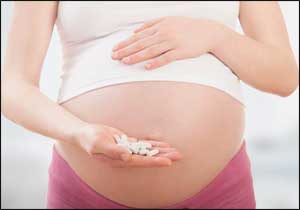- Home
- Editorial
- News
- Practice Guidelines
- Anesthesiology Guidelines
- Cancer Guidelines
- Cardiac Sciences Guidelines
- Critical Care Guidelines
- Dentistry Guidelines
- Dermatology Guidelines
- Diabetes and Endo Guidelines
- Diagnostics Guidelines
- ENT Guidelines
- Featured Practice Guidelines
- Gastroenterology Guidelines
- Geriatrics Guidelines
- Medicine Guidelines
- Nephrology Guidelines
- Neurosciences Guidelines
- Obs and Gynae Guidelines
- Ophthalmology Guidelines
- Orthopaedics Guidelines
- Paediatrics Guidelines
- Psychiatry Guidelines
- Pulmonology Guidelines
- Radiology Guidelines
- Surgery Guidelines
- Urology Guidelines
Nifedipine not safe in pregnant woman with aortic stenosis: Case Report

USA: Nifedipine, the preferred drug used for managing premature labour, maybe risky in certain pregnant women with the cardiac condition aortic stenosis, indicates a case report published in the Annals of Internal Medicine journal.
Cullen Soares, and Michael Gilson, both of the Warren Alpert Medical School at Brown University in Providence, Rhode Island, reported the case of a 31-year-old woman who was 18 weeks pregnant. She had a twin pregnancy and had a successful intrauterine ablation procedure at 18 weeks gestation. She had severe stenosis of the bicuspid aortic valve," but no other risk factors for vascular disease. Following the procedure, she was given the standard prophylaxis for tocolysis or premature labour.
Within an hour of the treatment, the patient developed hypotension "with diffuse ST-segment depressions on an electrocardiogram." She was then treated with intravenous phenylephrine, which is indicated to increase blood pressure in adults with clinically significant hypotension, and transferred to the cardiac care unit where the patient was evaluated and phenylephrine was withdrawn.
The patient was then treated with norepinephrine ("to provide better blood pressure support") and calcium gluconate ("to reverse the effects of nifedipine"). After she was stable, she was given indomethacin, another agent which can prevent premature labor, in place of the nifedipine, the authors said.
Clinicians should potentially order echocardiography for pregnant women with aortic stenosis, which can cause chest pain, fainting, and heart failure, and when a woman has signs and symptoms consistent with aortic stenosis, another drug other than nifedipine should be used to prevent premature labour, advise the authors.
While heart failure is rare in pregnant women with aortic stenosis, "the hemodynamic changes that accompany late-term pregnancy make these women particularly sensitive to the vasodilation caused by nifedipine," they argued.
"Nifedipine for tocolysis is commonly used and generally well-tolerated in healthy women. However, there is a lack of data about its use in twin pregnancies, and recommendations advise cautious use in patients with cardiovascular dysfunction," they wrote. "Nifedipine for tocolysis has been reported to cause severe maternal hypotension leading to fetal death, but not enough is known about the frequency of these adverse events."
As such, the authors concluded that clinicians should order echocardiography, as well as avoid use of nifedipine to prevent premature labour in women with "historical or physical examination findings" that suggest aortic stenosis.
More Information: "Nifedipine-Induced Shock in Pregnancy With Aortic Stenosis" published in the journal Annals of Internal Medicine.
DOI: 10.7326/L19-0481
Journal Information: Annals of Internal Medicine

Disclaimer: This site is primarily intended for healthcare professionals. Any content/information on this website does not replace the advice of medical and/or health professionals and should not be construed as medical/diagnostic advice/endorsement or prescription. Use of this site is subject to our terms of use, privacy policy, advertisement policy. © 2020 Minerva Medical Treatment Pvt Ltd